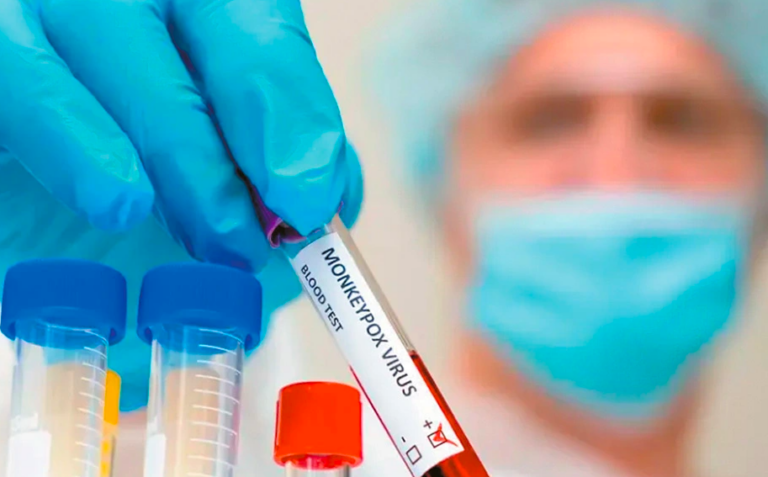Experts warn that it is only a matter of time before more cases of the new contagious variant of monkeypox (mpox Clade Ib) are identified in Europe. This follows the first imported case reported in Sweden a week ago.
During the previous outbreak, from June 2022 to April 2023, 88 individuals in Greece were infected, with 15 requiring hospitalization, while 238 suspected cases were investigated.
According to Professor Dimitris Paraskevis, an epidemiologist, “The virus primarily spreads through sexual contact or very close physical contact.” Regarding the symptoms, he explains that “they include fever, headache, muscle aches, back pain, swollen lymph nodes, chills, and fatigue. The majority of cases experience mild symptoms. However, for pregnant women, young children, and immunocompromised individuals, the illness can be more severe. The characteristic rash usually appears 1 to 5 days after the onset of symptoms.”
This new strain is responsible for 95% of this year’s monkeypox cases in the Democratic Republic of the Congo and other African nations and is considered more transmissible and infectious.
European and national health authorities believe that if guidelines and action plans are followed, containing the virus will only be a matter of time. Key strategies include awareness, surveillance, testing, early diagnosis, contact tracing, vaccination, and treatment, which have all been activated to manage the mpox virus, as is typical for any health threat.
“The difference now compared to the situation that surprised us all in May 2022, when monkeypox cases began appearing in non-endemic countries like Europe, is that we now have experience, knowledge, awareness, and an action plan,” says Professor Paraskevis from the National and Kapodistrian University of Athens. “Back then, multiple transmissions occurred, and the response only began after the cases had spread. If imported cases are diagnosed quickly and measures are taken to control them, the situation will remain under control.”
Two years ago, the World Health Organization (WHO) labeled the outbreak of infections outside Africa (where the mpox virus circulates in Central and West African countries) as a surge of cases in non-endemic countries with global significance. Recently, the WHO declared the monkeypox epidemic in Africa a global health emergency. The first European countries to report cases as the virus spread from Africa to Europe were the UK, Spain, and Portugal, with over 22,000 cases reported across Europe.
Vaccination Centers
Following the recent outbreak and adhering to guidelines from the WHO and the European Centre for Disease Prevention and Control (ECDC), the Greek Ministry of Health has already opened two vaccination centers in the “Andreas Syggros” and Attikon hospitals, with plans to open five more across the country by the end of the month. University hospitals in Alexandroupolis, Patras, Heraklion, AHEPA, and Evangelismos will also offer free vaccinations against the mpox virus. Notably, all available appointments for August and September at “Andreas Syggros” were quickly booked.
Greece has received 5,000 vaccines through the European HERA support mechanism and has ordered another 1,500 vaccines. Currently, the vaccine (Jynneos) is recommended for individuals over 18 at high risk of mpox infection, such as men who have sex with men (MSM), men who have sex with both men and women and transgender individuals. It is also recommended for healthcare workers in high-risk environments (e.g., laboratories, specialized units), those who have had close physical contact with confirmed mpox cases within 4 to 14 days after exposure, regardless of gender, and individuals who frequently have close contact with people in the aforementioned categories. Particularly important during this phase of the Clade Ib variant is the vaccination of vulnerable immunocompromised individuals.
“This new strain shows significant genetic differences from the previous Clade II strain, which caused the 2022 epidemic surge. It appears to be more transmissible and infectious, at least in Africa, where it has spread extensively,” says Professor George Sourvinos, Clinical Virology expert at the University of Crete.
The Outbreak in Greece
A study led by Professor Paraskevis, with contributions from 21 other scientists, documented the epidemic surge in Greece from June 2022 to April 2023. The study was published in June of the same year by the National Library of Medicine. During this period, 88 cases were reported in Greece, six of whom were travelers visiting the country, while the rest were residents of Greece. Among the 82 residents, 73 held Greek nationality. All 88 cases were men, 82 of whom (93.2%) self-identified as men who have sex with men. The median age was 37 years (ranging from 16 to 62 years)—all but one patient was an adult.
Twenty-four individuals reported traveling to countries with reported mpox cases. Sexual contact was identified as the most likely mode of transmission for 78 individuals. The most frequently reported symptom was a rash, followed by swollen lymph nodes and fever. Fifteen individuals required hospitalization, but no intensive care admissions or deaths were reported.
Ask me anything
Explore related questions





